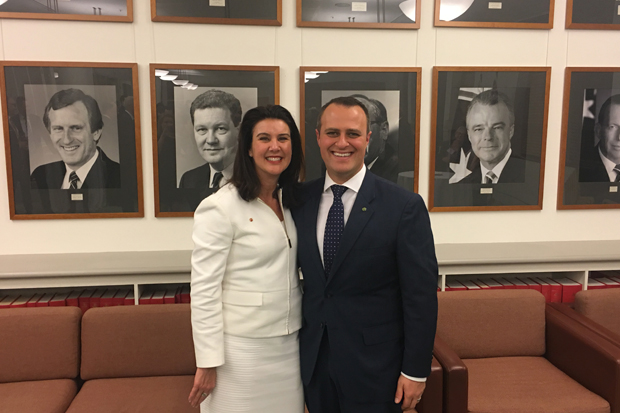First speeches are one of the few times Parliamentarians can present their motivations to the Chamber. After a precarious election result it would be wrong to think new MPs are glum. The first speeches of the class of 2016 exude a liberal confidence despite the nation facing a crossroads moment.
Andrew Wallace (Fisher) was spirited in arguing that ‘our greatest enemy is our own apathy’ with Ted O’Brien (Fairfax) who argued that ‘we have a choice: either we be complacent… [or] we take control of our own destiny’.
The challenge facing Liberals is enormous. New representative from Tasmania, Senator Jonathon Duniam argued we just fight the ‘seven crimes of modern society: wealth without work; pleasure without conscience; knowledge without character; commerce without morality; science without humanity; worship without sacrifice; and, perhaps above all, politics without principle’. These seven ‘crimes’ too often reflect the political reality presented by Labor and the Greens.
All speeches thread the strength of liberalism – a philosophy that seeks to conserve our culture and institutions under the freedom of individuals to decide their own future in economic and social affairs.
Jason Falinski’s (Mackellar) highlighted ‘free markets are not about money; they create fundamental social benefits. They empower the individual and turn our most selfish traits into public good. They civilise us all’.
And translating economic freedom into policy was best put by Trevor Evans (Brisbane) who launched a full frontal assault on industrial relations. He argued ‘in industries like retail the penalty rate system is a sham and a lie’ because small businesses can’t pay them and so use family members on weekends whilst big businesses ‘use agreements with big unions to water down and avoid penalty rates’.
But it was coupled with an understanding that free markets need to be perceived as just. With John McVeigh (Groom) arguing that ‘each member of the chain needs to share in the benefits of commerce if we are to successfully compete with the world and develop our own communities’.
And there is no greater justice than the preservation of the social contract that underpins intergenerational equity. Youthful Victorian Senator James Paterson highlighted that ‘on all current trajectories, it is my generation which will be left with the task of repaying the debt accrued by this one’.
Paterson’s sentiments were echoed by the other new Victorian Senator, Jane Hume, who argued ‘we can never allow borrowed money of any kind to pay for social safety net spending… [which] is simply one generation indulging at the expense of another’.
One of the most welcome trends is an awareness that economic freedom is directly connected to personal freedom. Trent Zimmerman (North Sydney) regards ‘economic freedoms as the inseparable twin of personal liberty’ because you can’t control the economy without controlling people.
And advancing social freedom requires a respect for individuality. Chris Crewther (Dunkley) argued ‘we should oppose laws forcing women to wear the veil and, equally, oppose women being restricted by law from wearing the burqini’. Such statements aren’t arguing for a moral relativism.
As Julia Banks (Chisholm) made clear ‘the cause for women is [not] progressed by demonising or labelling men’. Her view was supported by Nicolle Flint (Boothby) who argued, ‘freedom is the simplest way to explain what it means to be a Liberal [because] we want people to have the freedom to choose their path [and] succeed, not because of gender or skin colour, but because of merit’.
Fulfilling that vision requires preserving our culture, as Evans argued: ‘medieval ideals and concentrated political power both share a common lack of respect for the fundamental value of a human life. Liberal democracy will continue to prove itself, the only consistent friend of those around the world who are women, gay, or ethnic or religious minorities’.
That’s why strong institutions matter. Today ‘the left’ of the political spectrum is consumed by identity politics and governs for the patchwork of identity groups that they can piece together for an electoral majority. And with such an approach so goes preserving our way of life if it becomes inconvenient.
It’s why Wallace is bang on when he argues ‘the family unit is paramount in our community… [even if it] continues to evolve’. Similarly O’Brien argues for an ‘Australia with a strong civil society… because we made local communities more resilient, because we increased participation in our democracy and restored trust in our institutions’.
And that case was made strongest by Julian Leeser (Berowra) who made a staunch defence of the Constitution ‘written in Australia, by Australians, for Australian conditions’.
But his strength was matched by a human compassion that smoothed the edges off the sharpness of institutions calling for ‘active engagement in community [that] fosters civility, courtesy and understanding—virtues that are all too often undervalued and supplanted by anger’.
Such an attitude reflects an understanding that liberal democracies are societies governed by individuals, forming families, community and ultimately country; not the other way around.
That is what Liberals understand, as Senator Hume articulated: ‘the Liberal Party’s central, motivating purpose is not fighting against things; it is fighting for people’.
Based on the speeches of the class of 2016, a fighting and confident liberalism is on the front foot.
The post Them’s fighting words appeared first on The Spectator.
Got something to add? Join the discussion and comment below.
Get 10 issues for just $10
Subscribe to The Spectator Australia today for the next 10 magazine issues, plus full online access, for just $10.
You might disagree with half of it, but you’ll enjoy reading all of it. Try your first month for free, then just $2 a week for the remainder of your first year.














Comments
Don't miss out
Join the conversation with other Spectator Australia readers. Subscribe to leave a comment.
SUBSCRIBEAlready a subscriber? Log in